By having the right epos solution in place, you can increase your profits by at least 3% a year. So says Jamie Shipstone, sales and marketing director for YP Electronics. He explains: "By responding to accurate trading records, you will be able to control stock more professionally, save valuable management time, and offer your customers exactly the right range of goods at the right time. Valuable margin is maintained at the point of sale and orders can be compiled in seconds. Retailers can identify shrinkage, pinpoint best sellers, reduce out-of-stocks and analyse promotions, making informed decisions on what they know rather than what they think they know."
For many retailers epos is now well established as a retail tool so they are now looking for sophisticated IT solutions with more third-party involvement to deliver a wider range of wholesaler links. YP Electronics claims to have links to all the major wholesalers with the facility for retailers to order goods electronically and collect product file updates and electronic delivery notes, for individual wholesalers.
Shipstone continues: "Epos is all about having control of your business. The more retailers make use of the system, the bigger the gains." Of course there is cost involved but Shipstone reckons an epos system will pay for itself. "For example, a store turnover of £5,000 per week can add 3% to its annual margin with the installation of a good epos system, which would equate to £7,800 per year or £150 per week. Retailers have to take into account how many terminals they need based on their store’s turnover or footfall, and whether this increases on specific days and times of the week. As a general guideline, any store with a turnover of more than £7,000 a week would be advised to install two tills."
For forecourts, YP works with HTEC to deliver a total solution - its Sinqua back office system links with HTEC’s point of sale.
HTEC itself is enjoying great success with the grocery multiples on their petrol forecourts. Its HydraPOS has some major league fans with both Asda and Morrisons using it across some 450 sites while Spar has more than 60 HydraPOS installations.
Using Morrisons as a specific example, the grocery multiple has 275 forecourts all with Twin HydraPOS including HTEC’s resilient site controller and its fallback system which means operators never have to close their sites.
So what else does Morrisons get for its money? Well there’s HTEC’s web-based Virtual Back Office, which is a real-time system that reports on every event on the pos in real time. Then there’s the automatic number plate image capture which has an online central database linked to the pos to prevent fuelling by those with a history of drive-offs.
In addition Morrisons now has Chip & PIN OPTs on Wayne 9000 and Gilbarco SK700 pumps. The OPT can prompt for car wash sales and will print out the CODAX random number if the customer chooses this option.
HTEC’s online host interrogates every one of Morrisons 550 HydraPOS’ terminals approximately every 20 seconds. Automated alerts are raised at the Htec support centre if no activity is detected for agreed periods within the trading hours. Finally, Morrison Miles scheme operates from a swipe on the HydraPOS and goes on line to HTEC’s host to record the loyalty transaction then back to the pos for updated points printing, all within two seconds.
Obviously there’s a lot of interest in OPTs at the moment, and Torex is working with several suppliers with the intention of producing OPT interfaces for its Iridium system using IXRetail standard interfaces, providing an ’open platform’ for OPT integration.
HTEC’s OPT offer is called HydraOPT, and these units can be built into pump heads, or mounted on stands adjacent to the pumps. They are controlled by interfaces to the HydraPOS or in standalone mode. Commercial director, Colin Reeve, says: "Use of these units is becoming more and more widespread, especially as the fuel-buying culture changes via the introduction of unmanned sites by the major supermarket groups.
"HTEC now has 31 unmanned sites with Asda and rural independent retailer Scourie Filling Station, Inverness, (see case study) has just been equipped with HydraOPT to allow unmanned purchases at night and during the weekends.
"Another good thing about HydraOPT is that cash can still be used to purchase fuel either in unmanned or out-of-hours mode, as customers are able to load up a special card with a cash value during the site’s usual shop operating hours and then use the cash card in the card reader outside these hours. They are now using this option at the Malthurst/Somerfield site in Leicestershire."
Meanwhile, Tokheim claims that its new Crypto VGA Payment Terminal is the only Visa-PED/PCI-PED certified payment terminal on the market today.
Aside from OPTs, the other big issue is security and in particular, drive-offs. Again HTEC has this covered with its automatic number plate recognition (ANPR) system. In pump-linked mode, the system communicates with the site’s pump controller to automatically prevent fuel from being dispensed if the vehicle’s registration number is present on the drive-off database.
Reeves explains: "The ANPR systems’ camera zooms into a vehicle number plate once a pump nozzle has been lifted or when the driver inserts his/her card into an OPT. The registration number is captured and checked against the host database - in just a few seconds. If the registration number is then found to be linked to a previous drive-off, the relevant pump is automatically stopped from dispensing fuel.
"In standalone mode, the ANPR system’s cameras monitor the forecourt and display vehicle registration numbers on an operator screen. If a captured registration number is found on the database, the system alerts the operator, who can intervene to prevent fuel from being dispensed. A shared central database of sites can be used to catch drive-off thieves who travel around the UK."
Away from the major issues, there’s still a lot of development going on with epos as systems get more and more sophisticated.
Gilbarco Veeder-Root’s (GVR) claims that it is committed to providing leading edge products is backed up by the launch of a new product in its Passport Resolution family - the wireless hand-held terminal.
The device is directly connected to GVR’s back office software using standard wireless network protocols so there is no need to upload or download data as the data on the hand-held terminal is live.
Ian Jacques, UK retail solutions sales manager, says: "Even in a multi-site environment with the use of broadband and Virtual Private Networking (VPN), it is possible to use the hand-held terminal with live data at any remote site."
He says the key features and benefits include product details, price, stock availability and checking all carried out live on the shop floor saving valuable time and money.
Moving on, and the Radiant 1220 is present in thousands of retail outlets across the world, including petrol stations and convenience stores and now it’s available in the UK via Indigo Retail. Sales director Neill Friend says: "We’re bringing to the UK a system that has no moving parts so it’s quiet and more durable. The touch screen is also very resilient - the promotional video has cola pouring over the screen and it still works (although we don’t recommend this)."
Meanwhile, Radiant Systems provides a complete point of sale and fuel control system for petrol retailers. Its pos system is touch screen and built with a graphic user interface that is intuitive and immediately speeds up transaction time. Paul Grayling, vice president and general manager Europe, for Radiant’s global petroleum and convenience retail division, says: "One of the biggest drivers to updating epos systems is the increasing requirements around the ability to integrate with third-party solutions and data security.
"Radiant Point of Sale is designed to use industry standards such as IFSF, DOMS and PCATS-NAXML to interface to dispensers, credit networks and back-office systems. This is important because as data security standards become more stringent older generation systems will not be able to meet the processing demands of these requirements."
Finally NCR Corporation, which has built its reputation on supplying epos systems to major retailers, is now focusing on smaller ones with the introduction of its RealPOS 20 and 30 touch-screen terminals. The company says these provide all the durability and functionality of NCR engineering but at a price that is the same or lower than current PC-based systems.
At the same time, NCR continues to develop systems using the latest technology. Its new RealPOS 70 terminal, for example, has an integrated fingerprint reader which allows cashiers to log on at the touch of a finger using biometric technology. By making it impossible to log on with someone else’s ID, it prevents fraud on individual transactions. The till provides staff with a permanent biometric identifier that substantially reduces password management costs. Important when you consider that NCR says queries about passwords or pin numbers account for 30% of all calls to its help desks.





















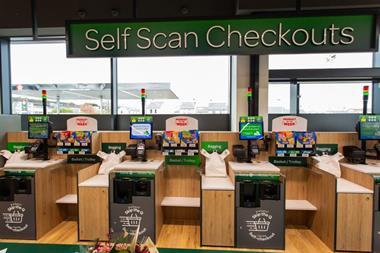
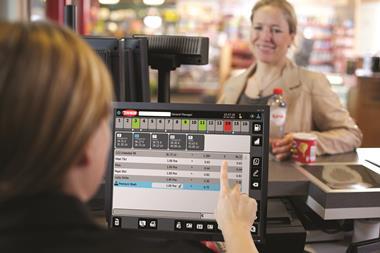
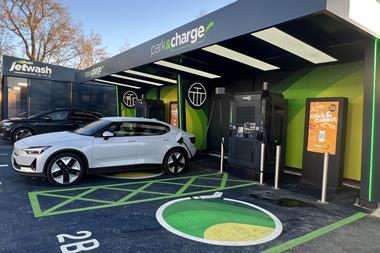

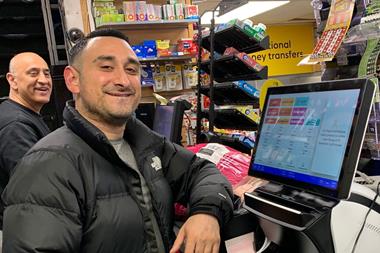
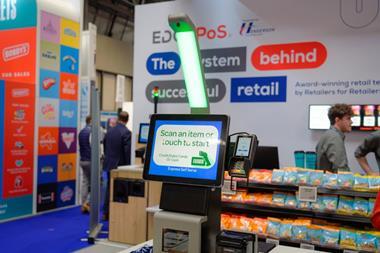
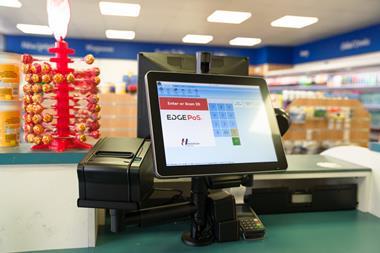
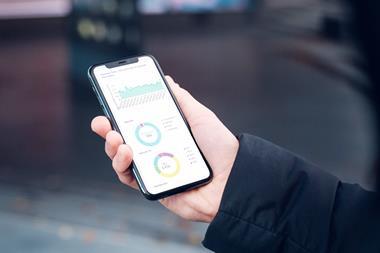
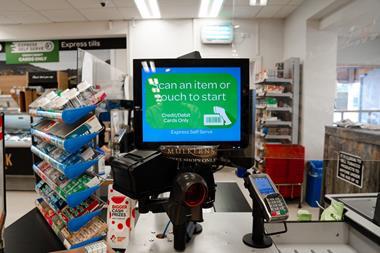
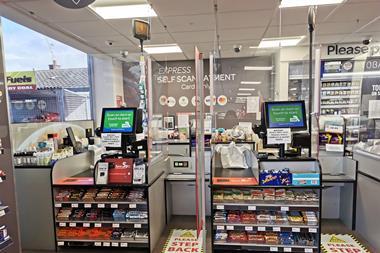
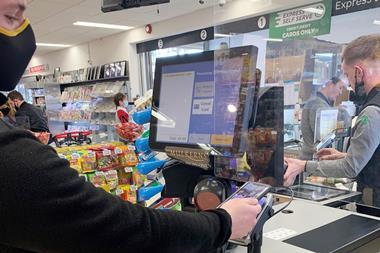
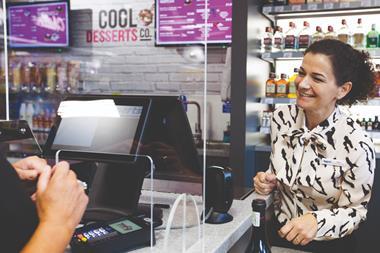
No comments yet